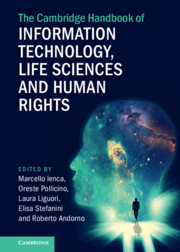Book contents
- The Cambridge Handbook of Information Technology, Life Sciences and Human Rights
- The Cambridge Handbook of Information Technology, Life Sciences and Human Rights
- Copyright page
- Contents
- Tables
- Contributors
- Acknowledgements
- Introduction
- Part I Life Sciences and Human Rights
- Part II Information and Communication Technologies and Human Rights
- Part III Towards a Convergence
- 18 Technological Changes and Rights Evolution in the Bio-digital Era
- 19 Human Dignity, Life Sciences Technologies and the Renewed Imperative to Preserve Human Freedom
- 20 Human–Machine Symbiosis and the Hybrid Mind
19 - Human Dignity, Life Sciences Technologies and the Renewed Imperative to Preserve Human Freedom
from Part III - Towards a Convergence
Published online by Cambridge University Press: 17 May 2022
- The Cambridge Handbook of Information Technology, Life Sciences and Human Rights
- The Cambridge Handbook of Information Technology, Life Sciences and Human Rights
- Copyright page
- Contents
- Tables
- Contributors
- Acknowledgements
- Introduction
- Part I Life Sciences and Human Rights
- Part II Information and Communication Technologies and Human Rights
- Part III Towards a Convergence
- 18 Technological Changes and Rights Evolution in the Bio-digital Era
- 19 Human Dignity, Life Sciences Technologies and the Renewed Imperative to Preserve Human Freedom
- 20 Human–Machine Symbiosis and the Hybrid Mind
Summary
This chapter argues that the notion of human dignity provides an overarching normative framework for assessing the ethical and legal acceptability of emerging life sciences technologies. After depicting the increasing duality that characterizes modern technologies, this chapter examines two different meanings of human dignity: the classical meaning that refers to the inherent worth of every individual, and the more recent understanding of this notion that refers to the integrity and identity of humankind, including future generations. The close connection between human dignity and human rights is outlined, as well as the key-role of dignity in international human rights law, and very especially in the human rights instruments relating to bioethics. The chapter concludes by briefly presenting the challenges to human dignity and human rights posed by neurotechnologies and germline gene editing technologies.
Keywords
- Type
- Chapter
- Information
- Publisher: Cambridge University PressPrint publication year: 2022
- 2
- Cited by

